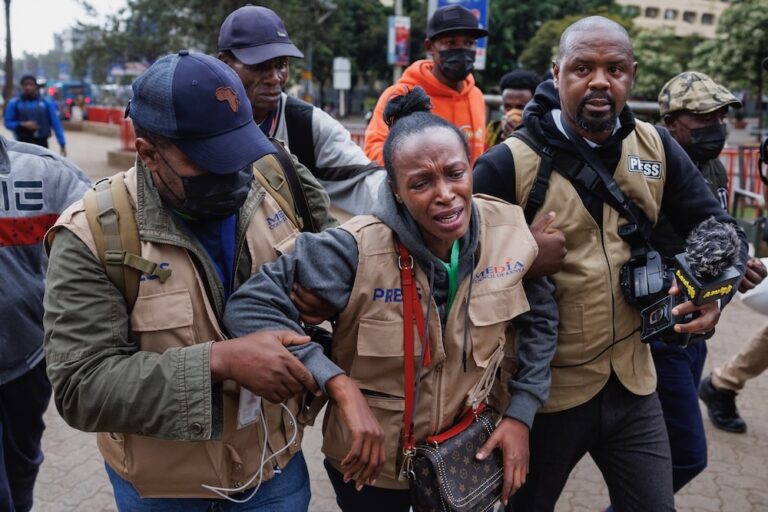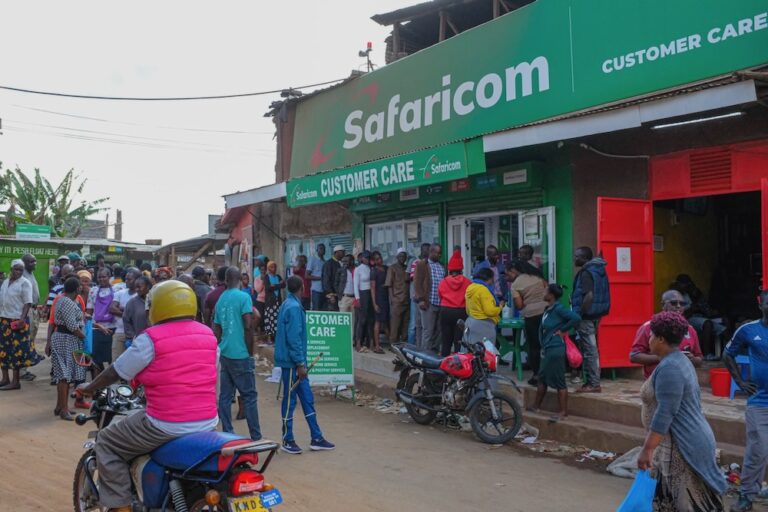(FXI/IFEX) – The following is a 14 September 2006 FXI press release: Kenyan journalist’s life in danger, hiding in South Africa The Freedom of Expression Institute will take up the case of Kenyan investigative journalist Clifford Derrick Otieno with the Special Rapporteur of the African Commission for Human and People’s Rights, the organisation has announced. […]
(FXI/IFEX) – The following is a 14 September 2006 FXI press release:
Kenyan journalist’s life in danger, hiding in South Africa
The Freedom of Expression Institute will take up the case of Kenyan investigative journalist Clifford Derrick Otieno with the Special Rapporteur of the African Commission for Human and People’s Rights, the organisation has announced.
For the past few months, Clifford has been hiding out in South Africa, doing a course at a South African university in order not to have to return to his native Kenya. He fears that a return home could endanger his life. Clifford does not belong to a political opposition group or some criminal syndicate; he is a journalist. His fear of returning home stems from his attempt to bring charges against the Kenyan First Lady, Lucy Kibaki, for assault.
On the 2nd May last year, the night before World Press Freedom Day, Lucy Kibaki visited the offices of the Nation, where Clifford worked as an investigative journalist. She wanted to complain about the portrayal of her family in the media. According to Clifford, she “confiscated all the reporters’ notebooks, cell phones, still cameras, video cameras and wanted reporters to switch off their computers”. Because Clifford’s video camera was still rolling and because she recognised him as a reporter who had covered other stories about her (including her ordering a policeperson to intimidate a World Bank official), she slapped him in front of a number of witnesses and damaged his camera.
Otieno initially simply wanted an apology from the First Lady for her attack and compensation for the camera. When she refused, he decided to lay charges against her. When, after three days, there was no follow up by the police, Otieno decided to proceed using the avenue of private prosecution. However, immediately after he applied to the Chief Magistrate for leave to pursue this course of action, the director of public prosecution took over the case and then terminated it. Ever since, he has had no joy through the justice system.
Worse, however, is that Clifford has been repeatedly threatened and harassed. Prominent personalities pressured him to unconditionally drop the case, he received death threats, unknown persons surrounded his house and his neighbours witnessed attempts to break into his house. A cabinet minister tried to bribe him and police actively prevented him from working by not allowing him access to places he was support to report from – like a collapsed building, in one instance. With his life in danger, Clifford found funding to briefly study in South Africa. However, that has not made his life much easier. The threats were then transferred to members of his family.
Clifford’s appeal to the constitutional court has not moved forward because of the state’s refusal to proceed. The Chief Justice, Evan Gicheru, constantly interferes with the bench of judges that he instituted to hear the case. Initially, he double allocated one of the judges that was to hear Clifford’s case. This caused the case to be postponed for four months. On the second occasion, the Chief Justice transferred one of the judges. The case had to be taken back to the Chief Justice for further direction.
A number of international media freedom organisations have expressed their support for Clifford. However, his matter seems like too much of a hot potato for groups in Kenya and he has received no support from human rights organisations in his country. This has resulted in Clifford’s being concerned about his safety were he to return home. With his money running out and his course ending in December, he is at a loose end about what to do next.
The FXI supports Clifford’s call on human rights and media freedom organisations to apply pressure on the Kenyan government to guarantee Clifford’s safety when he returns to Kenya, to give him an assurance that no state organs will harass him or his family upon his return and for the director of public prosecutions to give him an assurance that his assault case against Lucy Kibaki will be pursued.
In many countries on the African continent, the safety of journalists is very precarious. When journalists pursue an independent, investigative path, they are often subject to harassment by state agencies and members of government. It is a matter that the FXI has been seized with for much of its 12-year existence. Physical assaults, threats of harassment and death against journalists and threats to media freedom cannot be tolerated this was the reason that the FXI participated in the founding of the Network of African Freedom of Expression Organisations. The case of Clifford Derrick Otieno, then, will be just one case of the threat to journalists that the FXI will raise with the African Commission on Human and People’s Rights.
BACKGROUND:
Clifford holds a diploma in journalism and public relations from the Kenya Polytechnic. He has four years experience as an investigative freelance journalist specialising in exposing crime, corruption and violation of children rights. His excellent work has made a tremendous contribution to the reduction of criminal activities within Kenya’s capital, Nairobi. He has also exposed several scandals within the city council and in other government bodies.
Clifford has been awarded a total of seven journalism awards, including the prestigious CNN African Journalist of the year award in 2004. In 2005, at the Kenyan Union of Journalists awards’ competition, he was awarded the overall Kenyan Journalist of the Year award for his innovative and groundbreaking ideas on producing investigative stories for television. At the same competition, he also received the overall Investigative Journalist of the Year award, the Crime Reporter of the Year award and the Children Rights Reporter of the Year award. A programme that he used to contribute to, the “Inside Story”, aired on the Kenya Television Network (KTN), was awarded the best Local Investigative Programme.
In 2004, the UN-Habitat, through its “Safer Cities” programme, named “Inside Story” as the best investigative programme within eastern African countries. The award was recognition of how the programme has been able to focus on crime and investigative work that has an impact in terms of exerting pressure on the law enforcement authorities to become more vigilant. In 2003, Clifford also won the Kenya Union of Journalist’s Cameraman of the Year award.


